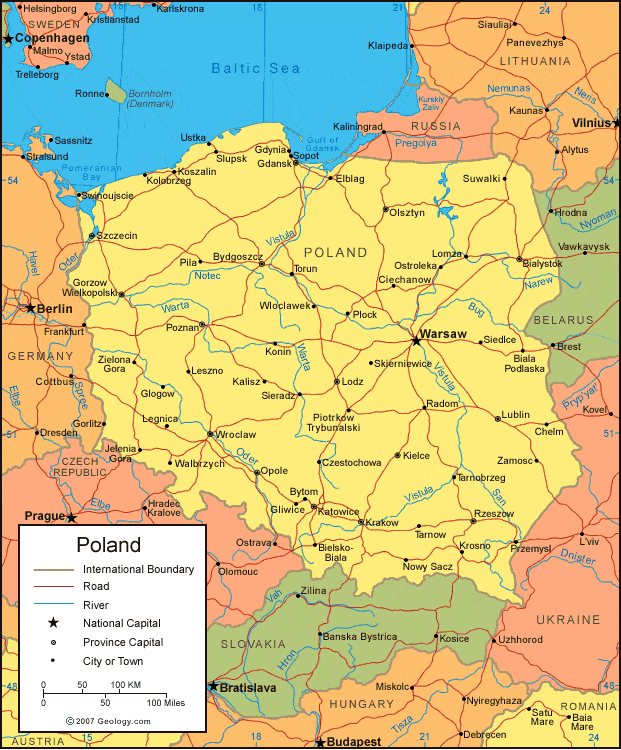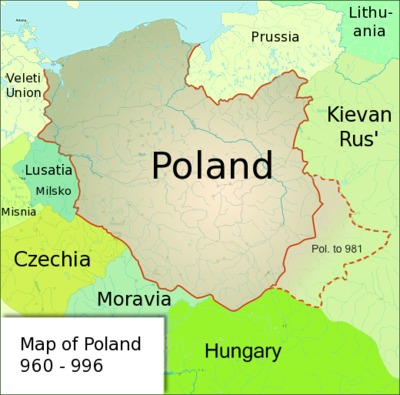The end of the first millennium saw the developing of conditions for future wars in Europe. Christianity slowly kept expanding, and Poland, still a pagan country, didn’t want to accept the new order from the Holy Roman Empire, our powerful Western neighbor. Instead, we asked to be baptized directly by the pope, thus separating ourselves from Germany. The Polish ruler, Mieszko, converted to a new religion in 966. Russia formally accepted Christianity in 988 from the Eastern Patriarch in Constantinople. And thus the foundations for the most future conflicts were built.
A Thousand years passed by. A millennium filled with countless conflicts, wars and uprisings. There were only short times in our history, when we were not up in arms. Here is the mind-boggling, sobering list of Polish Wars. https://en.wikipedia.org/wiki/List_of_wars_involving_Poland. Please don’t scroll down without looking at that reference. You will be aghast.
We fought the German invaders, the Russian invaders. Often both simultaneously. We fought armies from the North and from the South. We fought the Saracen Muslim armies, repeated incursions by the Mongol Empire. When the Ottomans kept invading Europe, Poland was the first country on their way to domination of Europe. The northern Teutonic Knights were a thorn in our side until their sound defeat in the battle of Grunwald in 1410.
Then more wars with the Ottomans. They killed men, raped women and kidnapped the young boys. They later trained them to become janissaries, their fiercest fighters. Turkish invasions were only occasionally interrupted by the fights with Crimean Tatars. Then came the resurgence of the Teutonic Knights and the creation of Prussia. When the western border seemed more or less secure, our Eastern lands were regularly raided by the Russians, rhythmically paced with frequent Cossacks’ rebellions. Then another Turkish crusade with Kara Mustafa surrounding Vienna, threatening, not for the first time, the destruction of this magnificent city. In 1683, the Habsburgs requested Polish help and our King, with his army of hussars, liberated the city. This was, in essence, the end to the Turkish ambitions. And, when the Swedes sensed Poland was vulnerable, we had to fight The Deluge, an invasion from the Northern Kingdom. More armed conflicts with our neighbors, and then came the three huge events. After the partitions in 1772, 1793 and 1795, Poland disappeared from the map of Europe. Just like that.
Then came the Napoleonic wars and the Poles, in exchange for their loyalty, got the promise to have their country back. Napoleon kept his word, and the Duchy of Warsaw was formed. It lasted as long as the emperor was in power. And after he was deposed, the Duchy ceased to exist, following de facto fourth partition of Poland. And the Polish Legions, so faithfully serving the emperor, ended up in Haiti, suppressing the local rebellion.
Throughout the 19th century there were countless uprisings, mostly against Russia, but also against Prussia and Austria. All of them were crushed, with Russia being particularly savage and inventive in erasing our Polish identity. Schools were closed, Russian introduced as an official language, and Polish culture mercilessly exterminated. Many of the Polish artists, scientists, and writers left to the west of Europe, and flourished there.
After the WW1, in 1918, we got our country back.
But not for long. Soon after the official proclamation, the Soviets, among others, invaded again, forcing us once more to defend our freedom.
People know our most recent history relatively better.
The September 1939 invasion by the Nazis started the WW2. A few days later, another attack by the Soviets, “to protect their minorities”. Another partition. Then the tragic Warsaw Uprising, brutally put down by the Germans at the cost of 200,000 of our lives. The Polish Army soldiers, who escaped from the German carnage, were relentlessly hunted down and cold-bloodily murdered by the Soviets and their Soviet-educated Polish communists. The usual method of execution was a shot to the back of the head.
After the of war, the victors had to address the problem of refugees. The fighting resulted in a mind-boggling human toll: 60 million killed and between 11 and 20 million displaced people. Most of them were translocated forcefully, many escaped anticipated repressions, often systematic killings. The Germans sent many Poles to their concentration camps, or, the lucky ones, to work on German farms. The Soviets, after murdering the elite of Polish military officers and top university professors, sent the rest to Gulags, deep in Siberia. From these frozen and arctic landscape, there was no escape, just an everyday fight for survival. A large Polish army tricked the Soviets and escaped through the southern mountainous border to Iran, and so joined the allies in the West of Europe.
After Yalta, Tehran, and Potsdam, all the refugees, in principle, had to be repatriated. But the borders were redrawn, and millions of the displaced people had to be relocated. All the German ethnic population from the area, which a thousand years ago was Polish, then became German, was sent back to Germany. This land was repopulated with the Polish people, who for years, under the harsh Russian and Soviet regimes, were displaced to Siberia. The Poles, who ended up in the West of Europe and tried to come back to their native country, were treated with a deep suspicion by their new, communist-sponsored government. The label of the imperialist spy was being attached freely, and the harassment was only a minor problem. The secret police were busy, their power unlimited and supervision non-existing. Their treatment was as bad as the treatment of Russian prisoners of war, which they faced coming back home to Mother Russia after the fighting was over. During the battle, the Wehrmacht mercilessly killed caught Soviet soldiers, summarily executed them or gave them to SS units to finish the dirty job. They starved remained troops to death if they lived long enough and survived the ubiquitous typhus. If they were still lucky and lived to the end of the war, Stalin treated them as traitors and tried them as an enemy of the people. Many had died.

Here is a map of Poland with the borders established in 1945:

And here there is another look at the map from around 1000 AD.
Not much difference, isn’t it?
So, the first question which comes to mind is: was it worth it? A thousand years of the vicious and relentless wars for no territorial gains whatsoever? Are we just a nation of stubborn, easily provoked, ready to fight at the drop of the hat, crazy people?
Or, one can look at the military history of Poland from the different angle.
It takes a lot of willpower, strength, determination, and sacrifice to maintain the integrity of the nation.
Not every ethnic group is qualified and strong enough to form a country. Having a common ethnicity, language and culture is not enough. There has to be a stable political and economic structure. And, the most important, the country has to be able to defend itself from the people, outside or within its own borders, people who don’t like the system. The defense from the invaders, be it from abroad or from within the borders, is the most important function of the government.
Poland lies on the vast plain of Europe, with only minimal natural borders. It is flanked by the two powerful nations, which throughout the history fought for the influence not only in Europe but often in the world. And fight they did! The twentieth century was only a most recent example. Our country was most of the time on their way, and neither Germany nor Russia wanted to have an enemy on their borders. And so the borders kept changing.
And the maintenance of our identity and preservation of our borders came at a steep price. Be it monetary or, even more costly, human sacrifice. But who would have ever thought, that the Polish Army, the fourth largest in Europe, after the Soviets, the United States and Britain, didn’t even participate in the Victory Parade after the end of the war! Obviously, Stalin intervened, and obviously, the Allies complied.
So, was it worth it?
From the cold calculations, probably not. The price of freedom was exorbitant.
But we paid all the necessary price to maintain our identity, not only preserve but also flourish our culture and maintain the borders. And for the ability to look in the eyes of our children, show them the map, and tell them: here you have it. You will take it from here.
Jeszcze Polska nie zginęła, póki my żyjemy…


